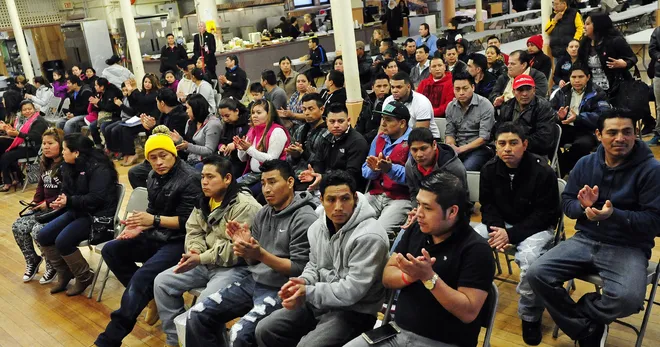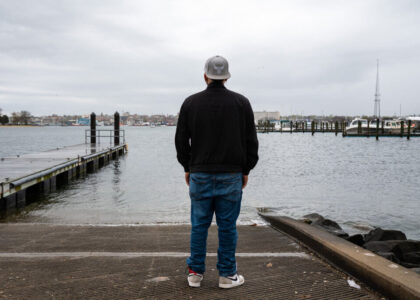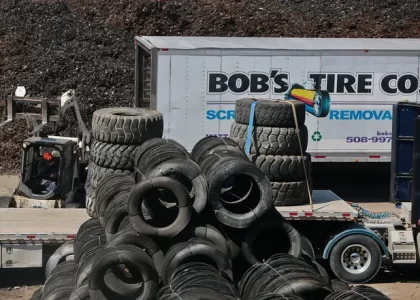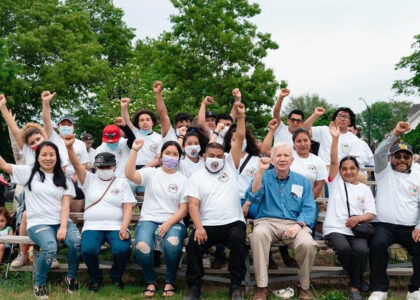NEW BEDFORD — Juan Sam, a longtime immigrant worker in the city, remembers vividly the day in March 2007 when an immigration raid at the Michael Bianco factory deported 361 undocumented immigrants who sewed backpacks and other equipment for U.S. troops.
“It was very sad. I didn’t imagine anything like that would happen to us,” he said Sunday through an interpreter at an event organized by Centro Comunitario de Trabajadores (Community Workers Center or CCT) at St. Anthony’s Church in the North End.
Sam worked at another factory then, but the incident traumatized not only the detained workers and their families but the entire immigrant community — almost everyone knew somebody who worked there. Many of the workers rounded up voluntarily signed deportation papers because they didn’t speak English and didn’t know what it meant.
A Mayan friend of his got deported, he said. It was later found that he was mistakenly sent back but when the government offered to bring him back, Sam said his friend refused.
Nine years later, the Central American immigrant community is “still living in fear,” Sam said. “They are very insecure because they don’t have the work permits they need.”
There are about 6,000 to 7,000 Central American immigrants working in the area today; about 2,200 of them work in seafood processing companies, according to Lisa Maya Knauer, sociology and anthropology professor at UMass Dartmouth who helped organize the event.
“We had been fighting against this exploitation for years with different organizations, but after the raid we decided to start our own organization focused on labor rights,” said Adrian Ventura, executive director of CCT. Ventura’s group currently monitors 28 processing plants in New Bedford and three in Fall River to help educate, organize and help workers with direct or legal action.
“We are not only talking about the impact of the 2007 raid. We are also commemorating CCT that has been around for seven years and really responded to the raid,” he said via an interpreter.
CCT has about 300 active members, but Ventura estimated it has helped more than 1,800 immigrant workers over the years.
More than 120 people, mostly Latin American residents, attended the event Sunday afternoon in the basement of the church. Some provided testimony of the raid that they either heard or were a part of.
Mateo Choc from Guatemala was one of the workers in the factory when Immigrations and Customs Enforcement (ICE) agents, accompanied by hundreds of other law enforcement officers, carried out an early-morning raid at the South End factory.
He stood quietly on stage Sunday as Knauer recounted the story of how he was wrenched from his family and sent to a detention center in Texas where he didn’t know anyone. Luckily, he got legal help and was not deported but it is an event that continues to haunt him to this day.
After the 2007 raid, investigations revealed that the Michael Bianco Company had routinely robbed immigrant workers of overtime pay.
Many immigrants continue to be exploited by not getting paid for overtime worked and having no health insurance. Sometimes, when there is an on-the-job injury, companies tell them to lie and tell the hospital workers that they got hurt at home, speakers said.
Jose Soler, former director of the labor education center at UMass Dartmouth and a supporter of the CCT, said the immigrant workers tend to be very hard-working, especially the women who work long hours at low pay to eke out a better living.
“These people have to be supported. Many New Bedford families came the same way — the Portuguese, the Irish. They are all working for a better life,” he said. “The CCT is a key group working for their rights.”
Immigrant workers have become proverbial scapegoats for the conversation around immigration, said Rev. Marc Fallon, a member of the United Interfaith Action and an organizer with Catholic Social Services, as he cited a hostile environment and negative attitudes towards undocumented workers nationwide.
“For a population like this to survive, I credit prayer and human generosity,” said Fallon, who remembers that fateful day of the raid and the helping hands from churches and organizations that reached out to help affected families.
The event began with a mass and ended with a cake. It spotlighted CCT’s ongoing efforts to obtain justice for immigrant and low-wage workers. A recent victory involved immigrant workers at Bob’s Tire, a local recycling company, who in September voted to be represented by the United Food and Commercial Workers Union, officials said.
After the first two speakers, two women from a St. Anthony Credit Union board meeting at the other end of the room interrupted and asked the group to stop using the microphone and not clap because they could not hear themselves. They were upset, they said, because they usually have the stage and the space to themselves for the annual board meeting.
The CCT group complied immediately. The two women declined to identify themselves afterward.




